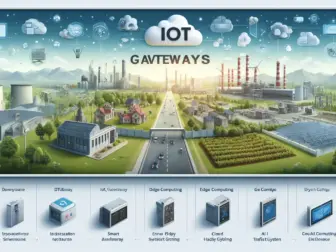Tag - Smart Traffic
Blog , June 6, 2024 , AI Gateway, AI in IoT, Cloud Computing, Cloud-Edge Collaborative Gateway, CoAP, Data Acquisition Gateway, Data Transmission, Edge Computing, Edge Computing Gateway, Industrial IoT, IoT Applications, IoT Gateway, IoT Gateway Selection, Real-time Data Processing, Smart Gateway, Smart Traffic
Revolutionizing Transportation: The Impact of Smart Traffic on Urban Mobility
Smart traffic technology is changing the way we navigate our cities, offering innovative solutions to alleviate congestion, improve safety, and reduce emissions. By utilizing advanced sensors, cameras, and data analytics, smart traffic systems can optimize traffic flow, detect and respond to accidents in real-time, and enhance communication between vehicles and infrastructure.
One of the key benefits of smart traffic technology is its ability to reduce traffic congestion. By analyzing traffic patterns and adjusting signal timings accordingly, smart traffic systems can help vehicles move more efficiently through intersections, reducing delays and improving overall traffic flow. This not only saves time for drivers but also decreases fuel consumption and emissions, leading to a cleaner and more sustainable urban environment.
In addition to reducing congestion, smart traffic technology can also enhance safety on the roads. By monitoring traffic conditions and identifying potential hazards, such as accidents or road closures, smart traffic systems can provide real-time alerts to drivers, allowing them to navigate around dangerous situations and avoid potential collisions. This proactive approach to safety can help prevent accidents and reduce the number of injuries and fatalities on our roads.
Furthermore, smart traffic technology can improve the overall efficiency of transportation networks. By coordinating traffic signals, optimizing bus routes, and providing real-time traffic information to drivers, smart traffic systems can help reduce travel times, increase the reliability of public transportation, and enhance the overall mobility experience for all road users. This can have a significant impact on economic productivity, as faster and more reliable transportation options can help businesses and individuals save time and money.
Overall, the implementation of smart traffic technology has the potential to revolutionize urban mobility and transform the way we experience transportation in our cities. By leveraging the power of data and technology, smart traffic systems can help us create more efficient, safe, and sustainable transportation networks that benefit both individuals and communities. As we continue to invest in smart traffic solutions and embrace innovation in transportation, we can look forward to a future where traffic congestion is a thing of the past, and our cities are more connected, accessible, and livable for all.
